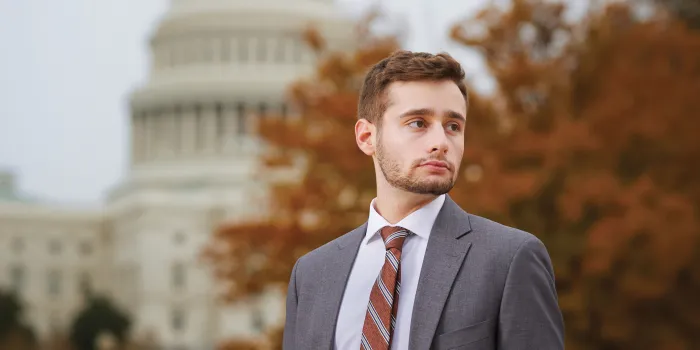My brother, Sam, and I were born on the same day 23 years ago. I was completely healthy, but he was born with a brain bleed and that’s how the doctors discovered he had hemophilia.
People ask if I was jealous of the attention Sam got growing up. I think every sibling of a child with a health problem can feel annoyed that you’re not getting quite as much attention, which happened occasionally.
But I was a part of the experience of growing up with a bleeding disorder in my own way. When we were younger, he got infusions three times a week. He laid on the couch, and my dad distracted him by reading a book while my mom infused him. I would lie on top of the back part of the couch and listen, too. Once in a while I’d get annoyed because three days a week there was always time dedicated just to Sam. The infusions probably didn’t take more than a few minutes. But to a kid, it can seem like hours.
I think the most confusing thing was that we couldn’t really fight because I never thought I could hit him. I was a pretty anxious kid—much more so than Sam—and I was constantly worried about him. My mom says when we were little, whenever Sam fell I’d run inside and get his favorite blanket for him.
In many ways, though, we were like any other set of twins growing up. We shared a room until we were 13, and our school was small, so we had a lot of the same friends. We played on some of the same sports teams, and we were always very competitive with each other.
I did keep looking out for him, though. But he made it clear that I didn’t need to worry about him. He could, and did, take care of himself just fine!
Today, Sam and I are still close, even though we live in different states. I work for a senator in Washington, DC, as a staff assistant. Sam is going to graduate school in New York City. I would say that my brother’s hemophilia has somewhat steered my career path. Since the age of about 8 or 9, I went to DC and met with representatives and Rhode Island senators on behalf of the National Hemophilia Foundation. So when I started looking for a college internship, I gravitated to the Hill.
Right now, my role is mostly administrative, but eventually I’d like to get into policy. My brother’s medicine costs hundreds of thousands of dollars each year. Insurance plans that offset these costs are vital for people with serious medical issues. Without strong insurance, 99% of people and families cannot pay for these medical bills. And, of course, people need access to hemophilia treatment centers, factor and other care.
In the future, I would love to be able to ensure that people who have hemophilia, as well as their families, have the care and financial support to ensure that hemophilia doesn’t dominate, let alone degrade, their lives.

